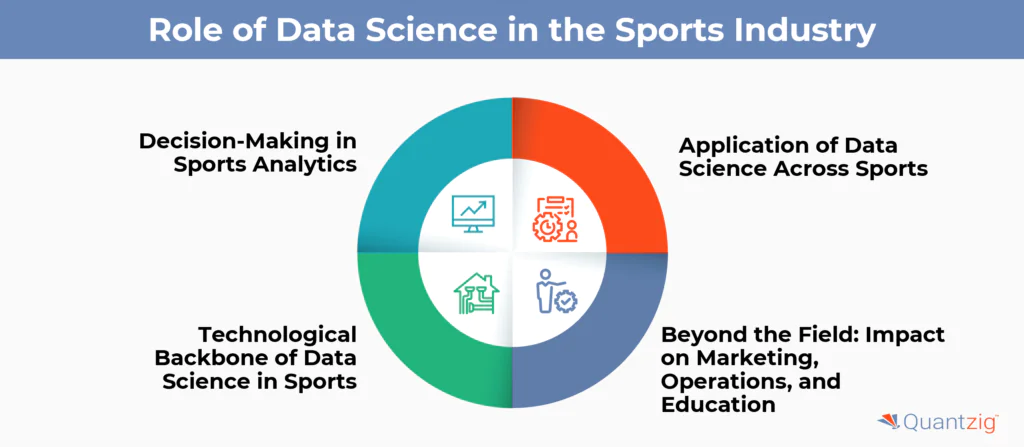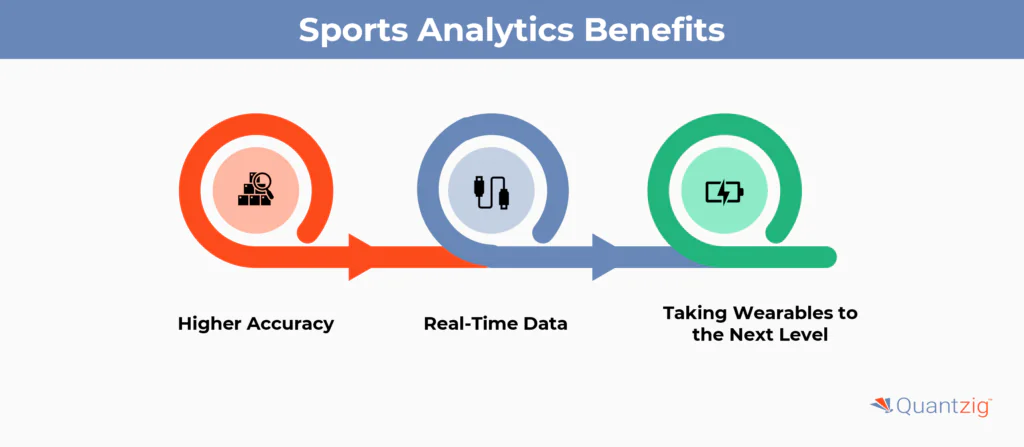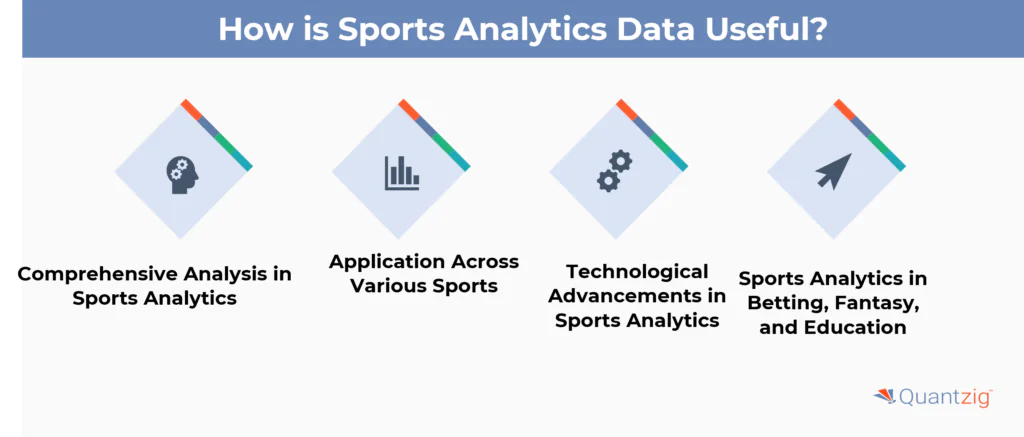Written By: Associate Vice President, Analytics and Data Strategy, Quantzig.
Table of Contents
Introduction to data analytics in sports
Analytics in sports is a relatively new concept that gained rapid popularity after Michael Lewis released his book on “Moneyball” in 2003. This tool has become a part and parcel of every athlete’s life, and most professional sports teams have a team of experts grinding the numbers and uncovering insights to improve performance. Teams of today scan scouting report from clipboards and send them across to scientists, who crunch the numbers that scouts and managers use to shortlist players for their teams. This helps in creating a profile of players who are the best fit for the team. Sports analytics is the future of professional sports as it helps teams to gain a competitive advantage. From the coaching staff to athletes, this tool has a big role to play when it comes to reshaping touchdowns, preventing injuries, and signing contracts. That being said, here’s Quantzig’s list of the top sports analytics benefits.
Our smart analytics solutions have helped many healthcare players. Book a demo to experience the meaningful insights we derive from data through our analytical tools and platform capabilities. Schedule a demo today!
Request a demo nowHow Sports Analytics Boosts Player Performance
Analytics in sports plays a pivotal role in shaping the future of the sports industry, utilizing cutting-edge technologies and innovative methodologies to harness sports data in the sports data companies. This multidisciplinary field transforms raw information into actionable insights, revolutionizing athlete performance optimization, game strategies, and sports outcomes.
1. Decision-Making in Sports Analytics
Data science acts as the driving force behind decision-making processes, delving into game scenarios, substitution patterns, and player selection. The meticulous examination of performance metrics, team requirements, and player mechanics training relies on advanced statistical analysis and visualization techniques. Biomechanics and training programs are fine-tuned through valuable insights, incorporating workload data, recovery metrics, and performance trends.
2. Application of Data Science Across Sports
From football to tennis, this tool is instrumental in unraveling the intricacies of each sport. In football, passing patterns, defensive strategies, and player positioning undergo comprehensive analysis. Hockey teams leverage this tool for offensive strategies, defensive tactics, and analyzing shot accuracy. Tennis enthusiasts benefit from valuable insights into opponents’ playing styles and match strategies.
3. Technological Backbone of Data Science in Sports
Wearable sensors, GPS tracking devices, high-speed cameras, and artificial intelligence form the technological backbone in sports. These tools enhance the precision of data, contributing to the development of training programs, schedules, and on-field metrics. Real-time insights aid in in-game tactical adjustments, injury prevention, and injury management.
4. Beyond the Field: Impact on Marketing, Operations, and Education
The impact of this solution extends beyond the field, influencing marketing campaigns, operational costs, and revenue generation for sports data companies. In sports betting, science groups specializing in analytic solution utilize historical data, algorithmic performance forecasting, and statistical breakdowns to inform decisions. Fantasy sports enthusiasts benefit from accurate choices influenced by possession value, expected goals, and goalkeeper expected goals.
It also plays a crucial role in this tool in education, fostering analytical skills among sports analysts, general managers, and broadcast announcers. The application of sabermetrics, exemplified by “The Bill James Historical Baseball Abstract,” demonstrates how this solution provides a statistical edge in baseball, considering metrics such as batting average, weighted on-base average, and weighted runs created plus.
In summary, this is the linchpin of the sports industry, permeating player performances, coaching strategies, and fan experiences. It spans across professional and collegiate sports, contributing to the ever-evolving landscape of athletic competition. As technology advances, this solution continues to be the driving force behind the transformation of sports analytics, ensuring the industry remains at the forefront of innovation.
Advantages of Data-Driven Decisions in Sports
Sports performance data analytics services are essential for gaining a competitive edge across various sectors. From professional leagues to analytics companies, data is reshaping decision-making and strategies. Focusing on Player Performance Metrics and optimizing both on-field and off-field performance, the industry is vital for coaches and analysts.
By utilizing advanced sports analytics software and data analysts’ expertise, organizations gain insights for Game Strategy Optimization and Injury Prevention in Sports. Benefits extend to Team Performance Analysis and Fan Engagement Strategies, while Predictive Analytics in Sports and real-time data analysis enhance Decision-Making in Sports, driving innovation in an evolving landscape.
| Feature | Description |
|---|---|
| Higher Accuracy | Many sports analytics companies are implementing technologies to track pitch accuracy. Sports like cricket and football are adopting these to clarify pitching and goal-scoring accuracy. |
| Real-Time Data with Sports Analytics Dashboard | New websites provide comprehensive data breakdowns for teams and players, tracking individual performance metrics and umpire calls for better insights into game outcomes. |
| Taking Wearables to the Next Level | The rise of wearable technologies helps assess player performance and determine recovery needs. Real-time stats like heart rate and speed aid coaches in planning training and rehabilitation. |
The sports analytics dashboard revolutionizes the industry, benefiting professional leagues and sports betting companies. With detailed data analysis, organizations gain a statistical edge in player development and broadcasting. Leveraging advanced models and insights from on-field and off-field analytics allows informed decisions that optimize performance, driving innovation and growth in sports management while enhancing the overall fan experience.
Experience the advantages firsthand by testing a customized complimentary pilot designed to address your specific requirements. Pilot studies are non-committal in nature.
Request a Free Pilot
What are the Sports Analytics Advantage within the Sports Branding Solution?
This tool plays a pivotal role in revolutionizing the landscape of athletic excellence by leveraging cutting-edge technologies and innovative methodologies. Through advanced analysis, teams gain invaluable insights into athlete performance optimization, game strategies, and sports outcomes. Sports Analytics advantages enhance decision-making across various facets of sports, ranging from game scenarios and substitution patterns to player selection and performance metrics.
| Feature | Description |
|---|---|
| Comprehensive Analysis in Sports Analytics | Sports analytics uses extensive data sets to understand team needs and player mechanics, including biomechanics and performance trends, enabling tactical adjustments and injury prevention. |
| Application Across Various Sports | This tool analyzes passing patterns in football, strategies in hockey, and opponent styles in tennis to recommend effective match tactics. |
| Technological Advancements | Technologies like wearable sensors, GPS tracking, and AI enhance accuracy in sports analytics, optimizing training programs and impacting marketing and revenue. |
| Sports Analytics in Betting, Fantasy, and Education | In sports betting, analytical tools use historical data and performance forecasts, while fantasy sports rely on metrics like possession value. Machine learning improves skills for analysts and executives. |
The integration of sabermetrics showcases the importance of statistical insights in baseball, using metrics like batting average and weighted runs created plus.
Get started with your complimentary trial today and delve into our platform without any obligations. Explore our wide range of customized, consumption driven analytical solutions services built across the analytical maturity levels.
Start Your Free Trial NowHow does the Future of the Sport Industry Look?
The future of sports performance analysis in the sports industry is poised for a transformative shift, driven by advancements in data analytics and technology. With the proliferation of sports broadcasting and the growing influence of sports betting companies, professional sports leagues are increasingly leveraging data to gain a statistical edge. From on-field analytics to off-field analytics, the sports data analysis industry is witnessing unprecedented growth, empowering coaches and sports analysts with actionable insights derived from sophisticated mathematical models.
This evolution extends beyond game strategy to encompass player development and performance optimization, ushering in a new era of precision and efficiency in sports management. As data analysts continue to play a pivotal role in deciphering trends and patterns, the future promises a dynamic landscape where innovation and data-driven decision-making redefine the essence of athleticism and competition in professional sports leagues.
Conclusion
In conclusion, sports analytics is a transformative force in the sports industry, impacting player performances, coaching strategies, and fan experiences. It extends its reach across professional and collegiate sports, making it an indispensable tool for sports organizations striving for success in the ever-evolving landscape of athletic competition.







